
"Crazy Little Thing Called Love" is a song by the British rock band Queen. Written by Freddie Mercury in 1979, the track is included on their 1980 album The Game, and also appears on the band's compilation album Greatest Hits in 1981. The song peaked at number two in the UK Singles Chart in 1979, becoming the group's first number-one single on the Billboard Hot 100 in the US in 1980, remaining there for four consecutive weeks. It topped the Australian ARIA Charts for seven weeks. It was the band's final single release of the 1970s.
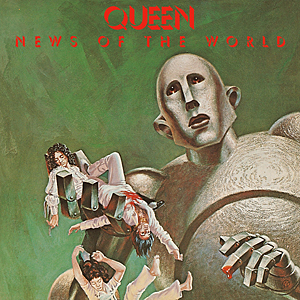
News of the World is the sixth studio album by the British rock band Queen, released on 28 October 1977 by EMI Records in the United Kingdom and by Elektra Records in the United States. News of the World was the band's second album to be recorded at Sarm and Wessex Sound Studios in London, and engineered by Mike Stone, and was co-produced by the band and Stone.

A Night at the Opera is the fourth studio album by the British rock band Queen, released on 21 November 1975 by EMI Records in the United Kingdom and Elektra Records in the United States. Produced by Roy Thomas Baker and Queen, it was reportedly the most expensive album ever recorded at the time of its release.
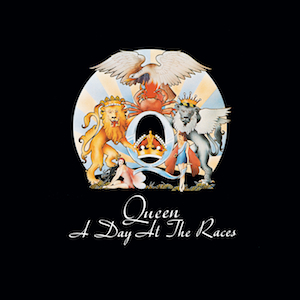
A Day at the Races is the fifth studio album by the British rock band Queen, released on 10 December 1976 by EMI Records in the United Kingdom and by Elektra Records in the United States. Recorded at The Manor, Sarm East, and Wessex Sound Studios in England, it was the band's first completely self-produced album, and the first completed without the involvement of producer Roy Thomas Baker; engineering duties were handled by Mike Stone. It serves as a companion to Queen's previous album, A Night at the Opera, with both taking their names from Marx Brothers films and having similar packaging and eclectic musical themes.
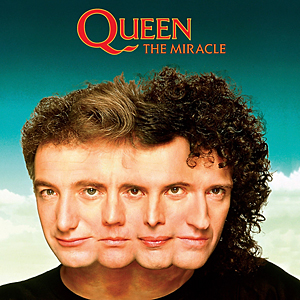
The Miracle is the thirteenth studio album by the British rock band Queen, released on 22 May 1989 by Parlophone Records and Capitol Records in both the United Kingdom and the U.S. respectively, where it was the band's only studio album to be released on latter label. The album was recorded as the band recovered from Brian May's marital problems and Freddie Mercury's HIV diagnosis in 1987. Recording started in January 1988 and lasted for an entire year. The album was originally going to be called The Invisible Men, but three weeks before the release, according to Roger Taylor, they changed the name to The Miracle. It was also the last Queen album with a photo of the band on the front cover.
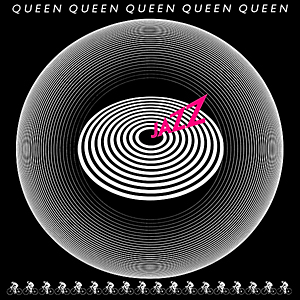
Jazz is the seventh studio album by the British rock band Queen. It was released on 10 November 1978 by EMI Records in the United Kingdom and by Elektra Records in the United States. Produced by Roy Thomas Baker, the album artwork was suggested by Roger Taylor, who previously saw a similar design painted on the Berlin Wall. The album's varying musical styles were alternately praised and criticised. It reached number two in the UK Albums Chart and number six on the US Billboard Top LPs & Tape chart.

Hot Space is the tenth studio album by the British rock band Queen. It was released on 4 May 1982 by EMI Records in the United Kingdom and by Elektra Records in the United States. Marking a notable shift in direction from their earlier work, they employed many elements of disco, funk, R&B, dance, pop and new wave music on the album. This made the album less popular with fans who preferred the traditional rock style they had come to associate with the band. Queen's decision to record a dance-oriented album germinated with the massive success of their 1980 hit "Another One Bites the Dust" in the US.

"Don't Stop Me Now" is a song by the British rock band Queen, featured on their 1978 album Jazz and released as a single on 26 January 1979. Written by lead singer Freddie Mercury, it was recorded in August 1978 at Super Bear Studios in Berre-les-Alpes (Alpes-Maritimes), France, and is the twelfth track on the album.

"Death on Two Legs" is a song by the British rock band Queen and is the opening track on their fourth album A Night at the Opera. The song was written by Freddie Mercury about the band's fall-out with their original manager and Trident Studios owner Norman Sheffield. Though the song makes no direct reference to him, Sheffield sued both the band and the record label for defamation. This resulted in an out-of-court settlement, thus revealing to the public his connection with the song. Mercury said that his lawyer had cautioned him against discussing the lyrics, but that it was written from a "very emotional" place for which he felt music was the best outlet. Roger Taylor also noted that despite the success of "Killer Queen" and Sheer Heart Attack, the album preceding A Night at the Opera, the band was lacking money before the album was made. Sheffield denied that he or his companies had mistreated the band in his capacity as manager, and cited the original 1972 management contracts between himself and Queen in his autobiography published in 2013, Life on Two Legs: Set The Record Straight, in his defence.

"No-One But You " is the final single recorded by the British rock band Queen. Recorded and released in 1997, six years after the death of lead singer Freddie Mercury, it is the only Queen recording to feature a three-piece lineup: guitarist Brian May, drummer Roger Taylor, and bassist John Deacon. May and Taylor share lead vocals. The song was released on the album Queen Rocks and it was also released as a double a-side single with "Tie Your Mother Down". It was later included on the compilation album Greatest Hits III.

"Spread Your Wings" is a power ballad by the rock band Queen, from their 1977 album News of the World. Written by bassist John Deacon, it was released as the A-side of the single "Spread Your Wings"/"Sheer Heart Attack" in 1978. According to music writer Benoit Clerc, "Spread Your Wings" was chosen as the 2nd single from News of the World because the band regretted releasing "Tie Your Mother Down" as a single from A Day at the Races over Deacon's "You and I."

"Fat Bottomed Girls" is a song by the British rock band Queen. Written by guitarist Brian May, the song appears on the band's seventh studio album Jazz (1978) and later on their compilation album Greatest Hits. When released as a single with "Bicycle Race", the song reached number 11 in the UK Singles Chart and number 24 in the Billboard Hot 100 in the US.

"Bicycle Race" is a song by the British rock band Queen. It was released on their 1978 album Jazz and written by Queen's lead singer Freddie Mercury. It was released as a double A-side single together with the song "Fat Bottomed Girls", reaching number 11 in the UK Singles Chart and number 24 in the Billboard Hot 100 in the US. The song is included in their 1981 Greatest Hits compilation.

"Long Away" is a song by the British rock band Queen; it is the third track on their 1976 album A Day at the Races. Brian May wrote the song and sings the lead vocals. It is the only Queen single released during Freddie Mercury's lifetime not to be sung by him, and was released as the third single from the album in North America and New Zealand only.

"Jealousy" is a song by British Rock band Queen which was originally released on their seventh studio album Jazz in 1978, and one year later was released as the fourth and last single from the album. It was written by Freddie Mercury.

"Las Palabras de Amor (The Words of Love)" is a rock ballad by the British rock band Queen. It was released as the third single from their 1982 album Hot Space. It is sung mostly in English, but with several Spanish phrases. Written by guitarist Brian May, the song proved more popular in the United Kingdom than their previous single ("Body Language"), reaching No. 17 in the UK Singles Chart.

"The Miracle" is the fifth and final single from Queen's 1989 studio album of the same name. It was composed by the entire band, though Freddie Mercury and John Deacon were the main writers. It was released as a single on 27 November 1989 and it was the band's final single release of the 1980s.

Crazy Tour was the seventh concert tour by the British rock band Queen during November and December 1979.
The Jazz Tour was the sixth headlining concert tour by the British rock band Queen, supporting the album Jazz. The tour was memorable for the spectacle created by the band. As James Henke of Rolling Stone said about the band's Halloween 1978 concert in New Orleans: "...when they were launching a U.S. tour in support of their Jazz, album, Queen threw a bash in New Orleans that featured snake charmers, strippers, crossdressers and a naked fat lady who smoked cigarettes in her crotch." Part of the European leg was recorded for the band's first live album, Live Killers.
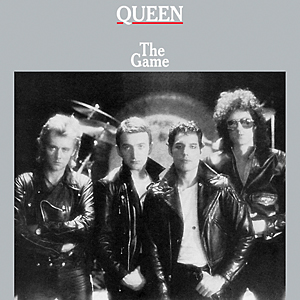
The Game is the eighth studio album by the British rock band Queen. It was released on 30 June 1980 by EMI Records in the UK and by Elektra Records in the US. The Game features a different sound from its predecessor, Jazz (1978). The Game was the first Queen album to use a synthesizer.


















